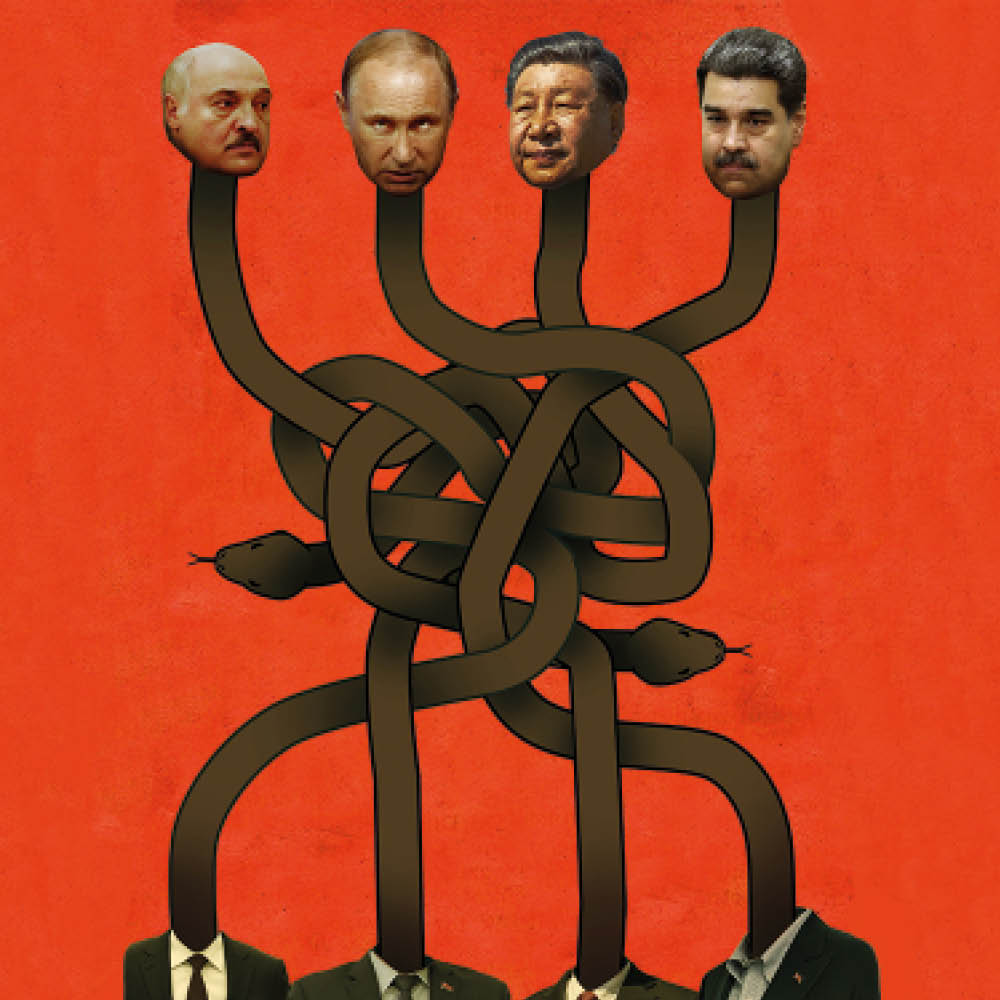Liberal democracy is endangered more by its friends than by its enemies. Neither Moscow nor Beijing lured the United States into strategic humiliations in Iraq and Afghanistan. Nor was the rise of China to the rank of a great power brought about by Westerners sympathetic to Beijing’s communist system. If liberal parties and movements in the United States and Europe seem to be losing ground to populists, this is not thanks to Facebook ads purchased by Vladimir Putin in support of Donald Trump or Brexit. Liberals themselves sabotaged liberal democracy by prioritizing liberalism over democratic legitimacy for three decades after the Cold War — on fundamental issues ranging from trade and foreign policy to immigration and national values.
Anne Applebaum’s latest book, Autocracy, Inc., is woefully inadequate to the times in which it appears. She argues that kleptocratic autocracies such as Putin’s Russia, Nicolás Maduro’s Venezuela, communist China and theocratic Iran are working together — coordinated by shared interests — to undermine the liberal West, which blithely leaves its financial system, media and political integrity open to subversion. As a remedy to the creeping influence of authoritarian states, she recommends measures that are not altogether liberal or democratic themselves, although Applebaum seems only dimly aware of the danger that in fighting monsters a righteous liberal like herself might come to resemble one.
But that’s a timeless problem: liberal democracies have always had to ask themselves how much liberalism or democracy can be sacrificed in the name of confronting foreign enemies, in wartime or in cold wars. What makes Autocracy, Inc. obsolete even as it hits the shelves, however, is that the countermeasures Applebaum wants the West to adopt will only exacerbate liberalism’s legitimacy problem. When governments that are already distrusted by millions of their own citizens take on new powers to invade financial privacy, censor information and commit their countries to hot or cold international conflicts, the predictable result is the strengthening of a populist backlash.
In fact, Applebaum’s description of “Autocracy, Inc.” in the book’s introduction will sound to many populists exactly like the domestic elites and “Deep State” that they see as their mortal enemy:
Sophisticated networks relying on kleptocratic financial structures, a complex of security services — military, paramilitary, police — and technological experts who provide surveillance, propaganda, and disinformation… Corrupt, state-controlled companies in one… do business with corrupt, state-controlled companies in another. The police in one country may arm, equip, and train the police in many others. The propagandists share resources...
Tucker Carlson couldn’t have said it better. A kleptocratic financial structure — one that, say, “debanks” an enemy like Nigel Farage — works toward the same ends as police and intelligence agencies that investigate Christian homeschoolers or people who pray silently outside abortion clinics, while “technological experts” at Facebook and other social media companies collaborate with government agencies to suppress critics of Covid lockdowns, and propagandists in the media share resources like the Steele Dossier that was designed to discredit the democratic election of Donald Trump in 2016. Applebaum is rightly horrified by the patterns she sees in modern autocracies. Yet those patterns can also be found in liberal democracies, and her policy recommendations would only further empower the abusers.
“If judges and juries are independent, then they can hold rulers to account,” Applebaum writes. “If there is a genuinely free press, journalists can expose high-level theft and corruption.” Yet right-wing populists are not the only ones who doubt that these conditions exist in the United States today: consider the way progressives, and indeed ordinary Democrats, talk about independent judges like Justices Samuel Alito and Clarence Thomas — or the doubts that the Black Lives Matter movement harbors about the justice of juries.
Neither the left nor the right in America — nor the mushy middle, for that matter — has much faith left in a mainstream press that appears highly selective about what “high-level theft and corruption” it spotlights. Media conditions in Russia or Iran or China are objectively far worse, but even Applebaum, while hyping the threat of foreign disinformation, is compelled to admit that outlets like the Kremlin-backed RT or “Chinese-sponsored channels, whose output is predictable and often boring” have little sway in the West. The media that matter here, for better or worse, are homegrown.
Autocracy, Inc. is a brief book that covers a great deal of ground. Yet in only 176 pages, not much can be covered well. This volume grows out of a 2021 essay Applebaum wrote for the Atlantic, “The Bad Guys Are Winning.” Her thesis was thin there and is thinner here. Applebaum would like readers to believe that today’s autocrats are a new breed distinguished by their kleptocratic ways from the more ideological totalitarians of the twentieth century. But there were plenty of kleptocratic authoritarians during the Cold War, too, and before it as well. She does see one development during the Cold War as setting the stage for today’s Autocracy, Inc.: when West German business and political leaders set principles aside to pursue profitable deals with the Eastern Bloc, they set a precedent for later Westerners to do business with dictatorships. Hopes of Wandel durch Handel, “change through trade,” became a smokescreen for self-interested actions that contaminated the West by mixing economic interests in the free world with those of kleptocrats outside, leading to fateful repercussions after the fall of the Berlin Wall. Western practitioners of Wandel durch Handel abetted the rise of political gangsters like Putin.
It’s an interesting tale, and Applebaum is at her best when examining history. She also notes the idealistic yet simultaneously self-serving post-1989 belief that trade with communist China would inevitably lead it to liberalism and democracy. Even here Applebaum is only half-right, though: she characteristically prefers simple moral contrasts to careful consideration of tradeoffs. China remained communist and grew into the power it is today, yet hundreds of millions of ordinary Chinese were lifted out of poverty through the West’s economic engagement, and China did experience some liberalization between Deng Xiaoping’s era and Xi Jinping’s regime today. What’s more, the decline of global poverty over the last thirty-plus years is the single greatest accomplishment of which the liberal international order can boast, certainly in the eyes of liberals themselves. Yet greater prosperity for the world’s most populous nation — as China remained until recently — could only come through trade that also enriched Beijing’s undemocratic regime.
Taking Applebaum’s criticisms into account, trade with the Soviet Union’s satellites still seems like the right decision, one that only hastened the unexpectedly peaceful end of the Cold War. Whatever benefits the unfree governments of Eastern Europe may have reaped from pipeline deals and other economic relationships that buttressed state finances were more than offset by the depletion of communist morale, which was brought about largely by greater state dependence on the West and wider exposure of Eastern European peoples to Western goods and culture. Applebaum poses a serious question about how Western policies might have fostered kleptocrats like Putin, but Autocracy, Inc. isn’t big enough to provide a well-argued answer.
Applebaum’s strongest moments are those where her focus narrows. Her last chapter, for example, poignantly relates the story of Evan Mawarire, a Zimbabwean pastor who became a symbol of national frustration with Robert Mugabe’s corrupt regime, until government harassment and a state-orchestrated defamation campaign forced Mawarire into exile. Applebaum considers him a cautionary tale of how autocrats can use the tools of modern media to besmirch and discredit opponents, accusing them of being foreign agents or financially crooked themselves — attacks extended to dissenters’ families and friends as well.
Here, too, you might doubt whether such vilification is a novel tactic, even if some of today’s techniques are new. But novel or not, Mawarire’s plight is emblematic.
Autocracy, Inc. is full of calls for greater financial disclosure of foreign financial interests in American businesses and real estate; for bringing together activists and officials from different democratic nations to devise grand campaigns against disinformation; and for convening meetings of dissidents from various autocratic states. Applebaum might find support in unexpected quarters for some of her disclosure and transparency proposals, if only she could refrain from demonizing anyone on the populist right. But as it stands, Donald Trump, Viktor Orbán and Poland’s Law and Justice Party are all merely villains in her melodrama. She doesn’t mention that her husband, Radosław Sikorski, has a history with Law and Justice and presently serves as Poland’s minister of foreign affairs under a rival party’s government.
Applebaum wants to unite democracies against autocracies, but democracy is meaningless if it isn’t local: “the West” is not a people in the political sense of the term, and when transnational interests or ideologues — including liberal ideologues — band together, the scale of their project makes it less than fully democratic. Applebaum represents a view from nowhere, from a clique, not a country. Strong nations can indeed work together, but they have to be cohesive first, and the liberalism Applebaum cherishes only undermines that internal cohesion.
This article was originally published in The Spectator’s July 2024 World edition.























Leave a Reply